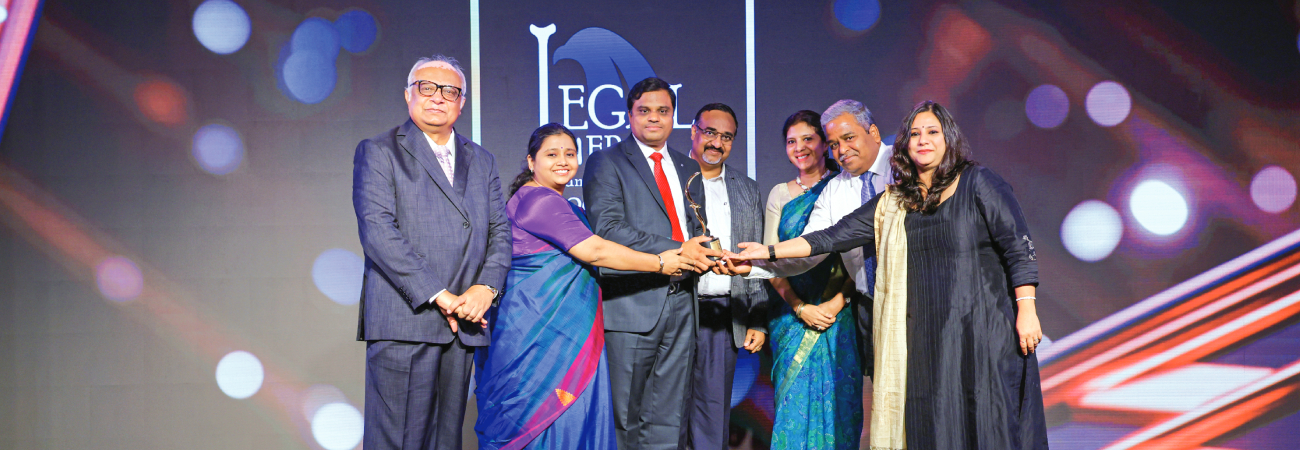Compliance and Ethics
At Tata Steel, we prioritise operating with integrity, transparency, and adherence to all applicable laws and regulations. By upholding the highest standards, we ensure trust, sustainability, and success in our operations.
Setting benchmarks
Compliance
Steel, in general, is a highly regulated industry in India with a good weight of laws, measures and protocols that govern its operations. Tata Steel by virtue of its sheer scale and diverse operations, is subjected to multifarious regulations which requires a rigorous understanding of complex legal and regulatory landscapes. Within this highly regulated sphere, compliance emerges as the quintessential watchtower, fostering a culture of accountability, safeguarding the Company’s integrity and fortifying stakeholder trust. Compliance at Tata Steel is rooted in the Company's code of conduct which unequivocally mandates adherence to the law of the land.

The Compliance Function has won its first "Compliance and Risk Management Legal Team of the Year" award at the 12th Annual Legal Era - Indian Legal Awards 2023.
The Compliance function assumes a critical importance within the organisation. By closely monitoring legislative changes, and best practices, the function helps the organisation anticipate and adapt to evolving compliance requirements. It assists us to mitigate the risk of potential litigations, hefty penalties, and punitive action by identifying the potential gaps in compliance, assessing their implications on organisational performance and reputation, and recommending corrective measures. We maintain transparency and communication with stakeholders informing them of our unwavering commitment to operate within the confines of the law.
The Compliance Framework adopted by the Compliance Function is a nuanced and all-encompassing approach to compliance and is the bedrock of our control mechanism. The framework overcomes the limitations of siloed compliance efforts, fostering a unified and synergistic approach and acts as a catalyst for continuous improvement.
Within the context of aligning and integrating compliance goals with our strategic objectives of profitability, capacity growth towards 40 MnTPA in India, achievement of benchmarks in sustainability and leadership in digitisation and productivity, the focus for the Compliance function will be:
Seamless implementation of the compliance framework across the Group fostering unified compliance practices
Develop robust mechanism for monitoring adherence to third-party compliance obligations ensuring regulatory adherence in external business relationships
Strengthen stakeholder engagement initiatives to nurture a sense of shared commitment
Enhancements to the Compliance Management System to improve oversight, streamline processes and manage compliance obligations in a comprehensive manner
Robust audit and risk management procedures to proactively identify potential areas of vulnerability
Realise assurance objectives through ISO certification
The function is led by the Company Secretary and Chief Legal Officer (Corporate & Compliance), who is primarily responsible for overseeing and managing regulatory compliances. The function is adequately staffed with compliance managers tasked with establishing business and industry-specific standards across all organisational entities. The Tata Steel Internal Audit function conducts audits on various matters, including compliance requirements. Such audit findings are presented to the Audit Committee and the Board of Directors.
Ethics
Tata Steel remains firmly on the path of an agile growth trajectory with ethical business practices, which are anchored in our Core Values, the Tata Code of Conduct and its Core Principles. There has been consistent effort on structurally nurturing a future-ready culture via implementation of uniform governance framework across the geographies, strengthening of relationship with customers and supply chain partners, promotion of diversity & inclusion and effective implementation with technology and digitalisation. All of these contribute towards effective deployment of MBE (Management of Business Ethics) enabling organisational success.
The four pillars of MBE are:
1 Leadership
The Corporate Governance structure includes Board level committees and management level committees, which oversee the deployment of vigil mechanism in the organisation.
The Senior Leadership Team takes the lead in communicating the values and principles through various forums, addressing different stakeholders across divisions, and thereby ensuring open and transparent culture. The key themes covered in such messaging and communication are ethics, innovation, technology, agility, inclusivity, diversity and sustainability.
The Ethics Coordinators and Champions are recognised for the initiatives taken by them to enforce ethical culture in their respective areas by CEO & MD in the Annual meet. Employees are recognised as “Reputation champions” based on the exemplary behaviour being demonstrated at workplace.
2 Compliance Structure
A robust vigil mechanism has been ensured through various systems and processes for deployment of the Tata Code of Conduct and related policies in the organisation. The WhistleBlower Policy for Directors and Employees & the Whistle-Blower Policy for Business Associates as well as the Policy on Prevention of Sexual Harassment are periodically reviewed and revised in accordance with regulatory requirements and changing workplace needs.
Tata Steel also has a third-party whistle-blowing helpline facility called ‘Speak Up’, which ensures stakeholders’ confidence in the whistle-blowing process. Facilities available are 24X7 toll free number, web access, postal services, and email.
3 Communication & Training
The role of Communication is crucial in deploying the MBE framework across the organisation. There are various communication platforms, including round table discussions for employees, business associate meets for vendors, distributors, suppliers, transporters and service providers and mass meetings at shop floor for connecting with the frontline employees and contract workforce.
Training programmes are designed taking target audience into consideration through online, classroom and web-based mediums on topics such as Prevention of Sexual Harassment, Respectful Workplace, Third Party Due Diligence among others.
4 Measurement of Effectiveness
The effectiveness of the deployment of MBE framework is constantly evaluated using feedback of MBE survey and MBE Assessment (an internal process). The MBE perception Survey, a survey to capture feedback from various stakeholders was conducted in FY2022-23.
The organisation will continue to focus on strengthening the ethical culture across all its locations by continuously reinforcing the policies and guidelines through communication and training of all the stakeholders, building greater transparency, incorporation of strong corporate governance practices and leveraging technology.